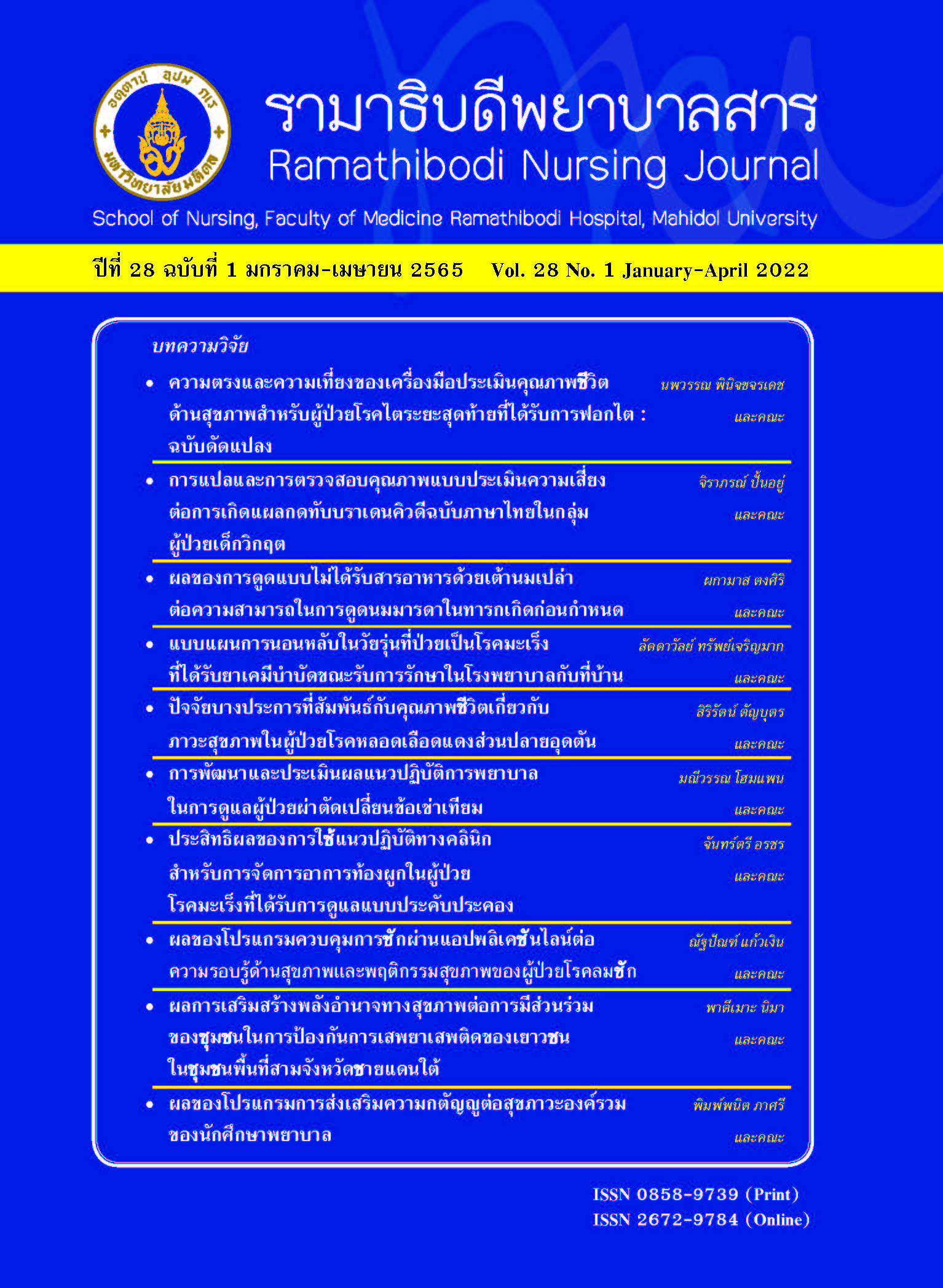ผลของโปรแกรมการส่งเสริมความกตัญญูต่อสุขภาวะองค์รวมของนักศึกษาพยาบาล
Main Article Content
บทคัดย่อ
การวิจัยกึ่งทดลองนี้ มีวัตถุประสงค์เพื่อศึกษาผลของโปรแกรมการส่งเสริมความกตัญญูต่อสุขภาวะองค์รวมของนักศึกษาพยาบาล คัดเลือกกลุ่มตัวอย่างจากคณะพยาบาลศาสตร์ 2 แห่งในภาคใต้ โดยการสุ่มตัวอย่างแบบกลุ่ม ได้กลุ่มทดลอง 27 ราย และกลุ่มควบคุม 28 ราย กลุ่มทดลองได้รับโปรแกรมการส่งเสริมความกตัญญู ส่วนกลุ่มควบคุมได้รับการดูแลตามปกติ เครื่องมือที่ใช้ประกอบด้วยโปรแกรมส่งเสริมความกตัญญูสำหรับนักศึกษาพยาบาล แบบสอบถามข้อมูลส่วนบุคคล แบบบันทึกข้อมูลสุขภาพองค์รวม และแบบประเมินภาวะสุขภาพองค์รวม วิิเคราะห์ข้อมููลส่วนบุุคคลและข้อมููลสุุขภาพองค์รวม โดยใช้สถิติเชิงพรรณนา และวิเคราะห์ข้อมููลค่าเฉลี่่ยภาวะสุุขภาพองค์รวมด้วยสถิติทดสอบแบบทีผลการวิจัยพบว่า ค่าเฉลี่่ยของคะแนนสุุขภาวะองค์รวมของนักศึกษาพยาบาลหลังการทดลองสููงกว่าก่อนการทดลองอย่างมีนัยสำคัญทางสถิติ และค่าเฉลี่่ยของคะแนนสุุขภาวะองค์รวมของนักศึกษาพยาบาลหลังการทดลองของกลุ่มทดลองสููงกว่ากลุ่มควบคุุมอย่างมีนั ยสำคัญทางสถิติ ดังนั้น โปรแกรมส่งเสริมความกตัญญููสามารถ
นำมาใช้เพื่อส่งเสริมการมีสุขภาวะองค์รวมในนักศึกษาพยาบาลได้
คำสำคัญ : ความกตัญญูู นักศึกษาพยาบาล สุขภาวะองค์รวม
Article Details

อนุญาตภายใต้เงื่อนไข Creative Commons Attribution-NonCommercial-NoDerivatives 4.0 International License.
บทความ ข้อมูล เนื้อหา รูปภาพ ฯลฯ ที่ได้รับการตีพิมพ์ในรามาธิบดีพยาบาลสาร ถือเป็นลิขสิทธิ์ของวารสาร หากบุคคลหรือหน่วยงานใดต้องการนำทั้งหมดหรือส่วนหนึ่งส่วนใดไปเผยแพร่หรือเพื่อกระทำการใด ใด จะต้องได้รับอนุญาตเป็นลายลักษณ์อักษรจากรามาธิบดีพยาบาลสารก่อนเท่านั้น
เอกสารอ้างอิง
World Health Organization, [WHO]. Constitution of the World Health Organization. 2021. [cited 2021 May 21].Available from: https://www.who.int/about/who-weare/constitution
Bunrome Suwanphahu B, Tuicomepe A, Kaemkate W.Wellness in adolescents: conceptual framework and psychological measures. Journal of Behavioral Science.2013;19(2):127-38. (in Thai)
Bryer J, Cherkis F, Raman J. Health-promotion behaviors of undergraduate nursing students: a survey analysis. Nurs
Educ Perspect. 2013;34(6):410-5.
Pitakavakath P. A study of characteristic of nursing students of the royal Thai navy college. [dissertation]. [Bangkok]:
Srinakharinwirot University; 2013. (in Thai)
Ruangpermpoon K, Rongmuang S, Nintachan P.Characteristics of social adjustment in nursing students.Ramathibodi Nursing Journal. 2011;17(3):478-92. (inThai)
Arpanantikul M, Putwatana P, Wittayasooporn J. Health status and health practices of Thai nursing students. Thai Journal of Nursing Council. 2011;26(4):123-36. (inThai)
Kaewsakulthong J. Factors predicting stress among nursing students under the Praboromarajchanok institute, Ministry
of Public Health. Journal of Health Research and Innovation. 2019;2(1):1-11. (in Thai)
Buajun A, Sawatsing T, Nuansithon N, Chotchai T.Resilience and stress among the 1st nursing students at Faculty of Nursing Chaiyaphum Rajabhat University.Journal of Graduate MCU KhonKaen Campus.2019;6(4):269-81. (in Thai).
Wolf L, Stidham AW, Ross R. Predictors of stress and coping strategies of US accelerated vs. generic baccalaureate
nursing students: an embedded mixed methods study.Nurse Educ Today. 2015;35(1):201-5.
Saito AS, Voraharn W, Senarak W. Happiness of undergraduate nursing students, Faculty of Nursing, Khon Kaen University. Journal of Nursing Science & Health.2011;34(2):70-9. (in Thai)
Teh HC, Archer JA, Chang W, Chen Annabel SH. Mental well-being mediates the relationship between perceived stress and perceived health. Stress Health. 2015;31(1):71-7.
Emmons RA. Queen of the virtues? Gratitude as human strength. Reflective practice: Formation and supervision in Ministry. 2012;32:50-62.
Lee JY, Kim SY, Bae KY, Kim JA, Shin llS, Yoon JS, etal. The association of gratitude with perceived stress and burnout among male firefighters in Korea. Pers Individ Differ. 2018;123: 205-8.
Yildirim M, Alanazi ZS. Gratitude and life satisfaction:mediating role of perceived stress. Int J Psychol Stud.2018;10(3):21-8.
Emmons RA, Stern R. Gratitude as a psychotherapeutic intervention. J Clin Psychol. 2013;69(8):846-55.
Noor NM, Rahman ND, Zahari MI. Gratitude, gratitude intervention and well-being in Malaysia. J Beh Scie.2018;13(2):1-8.
Balthip K, McSherry W, Petchruschatachart U,Piriyakoontorn S, Liamputtong P. Enhancing life purpose amongst Thai adolescents. J Moral Educ. 2017;46(3):295-307. doi: 10.1080/03057240.2017.1347089
Rash JA, Matsuba MK, Prkachin KM. Gratitude and wellbeing:who benefits the most from a gratitude intervention?Appl Psychol. 2011;3(3):350-69.
Lin CC. The relationships among gratitude, self-esteem,depression, and suicidal ideation among undergraduate students. Scand J Psychol. 2015;56(6):700-7.
Aparicio M, Centeno C, Robinson C, Arantzamendi M.Gratitude between patients and their families and health professionals: a scoping review. J Nurs Manag.2019;27(2):286-300.
Al-Seheel AY, Noor NM. Effects of an Islamic-based gratitude strategy on Muslim students’ level of happiness.Ment Health Relig Cult. 2016;19(7): 686-703.
O’Leary K, Dockray S. The effects of two novel gratitude and mindfulness interventions on well-being. J Altern Complement Med. 2015;21(4):243-5.
Kreitzer MJ, Telke S, Hanson L, Leininger B, Evans R.Outcomes of a gratitude practice in an online community of caring. J Altern Complement Med. 2019;25(4):385-91.
Khanna P, Singh K. Effect of gratitude educational intervention on well-being indicators among North Indian adolescents. Contemp Sch Psychol. 2016;20(4):305-14.
Alkozei A, Smith R, Killgore WDS. Gratitude and subjective wellbeing: a proposal of two causal frameworks.J Happiness Stud. 2018;19(5):1519-42.
Balthip Q, Chandrema S. Process of establishing purpose of life of Thai teenagers living with HIV. Songklanagarind Journal of Nursing. 2013;33(3):1-16. (in Thai)
Balthip K, Petchruschatachart U, Piriyakoontorn S,Piriyakoontorn S, Tiraphat N, Liamputtong P.Application of purpose in life and self-sufficient economic philosophy in enhancing the holistic health promotion of Thai adolescents. Songklanagarind Journal of Nursing. 2016;36(3):111-28. (in Thai)
Balthip K, Petchruschatachart U, Piriyakoontorn S,Chandrema S, Nilmanat K. Application of the purpose in life model for enhancing holistic health promotion of Thai adolescents living with HIV. Songklanagarind Journal of Nursing. 2018;38(4):49-67. (in Thai)
Balthip K, Petchruschatachart U, Piriyakoontorn S,Liamputtong P. Purpose in life among Thai junior high school adolescents. Songklanagarind Journal of Nursing.2017;37:89-97. (in Thai)
Polit DF, Beck C. Essentials of nursing research: appraising evidence for nursing practice. Philadelphia: Wolters Kluwer Health; 2018.
Leawarin U. Research and development of the gratitude training module enhancing the gratitude, responsibility and
learning outcomes of the Suan Sunandha Rajabhat University students. Research and Development Journal.2012;4: 1-16. (in Thai)
O’Connell BH, O’Shea D, Gallagher S. Examining psychosocial pathways underlying gratitude interventions:a randomized controlled trial. J Happiness Stud.2018;19(8):2421-44. doi: http://doi.org/10.1007/s10902-017-9931-5
Schache KR, Hofman PL, Serlachius AS. A pilot randomized controlled trial of a gratitude intervention for adolescents with type 1 diabetes. Diabet Med. 2020;37(8):1352-6.
Pasri P, Suwanruangsri S, Hounsri K, Balthip K,Boonyasopun U. The Development of Gratitude -Promoting Program for Nursing Students. Songklanagarind Journal of Nursing. 2021;41(3):13-23. (in Thai)
Lambert NM, Fincham FD, Stillman TF. Gratitude and depressive symptoms: the role of positive reframing and positive emotion. Cogn Emot. 2012;26(4):615-33.
Behzadipour S, Sadeghi A, Sepahmansour M. A study on the effect of gratitude on happiness and well being. IJOHP.
;1(2):65-72.
Hill Patrick L, Allemand M, Roberts BW. Examining the pathways between gratitude and self-rated physical health
across adulthood. Pers Individ Dif. 2013;54(1):92-6.
Ma M, Kibler JL, Sly K. Gratitude is associated with greater levels of protective factors and lower levels of risks in African American adolescents. J Adolesc. 2013;36(5):983-91.
Tulbure BT. Appreciating the positive protects us from negative emotions: The relationship between gratitude,
depression and religiosity. Procedia Soc. 2015;187:475-80.


